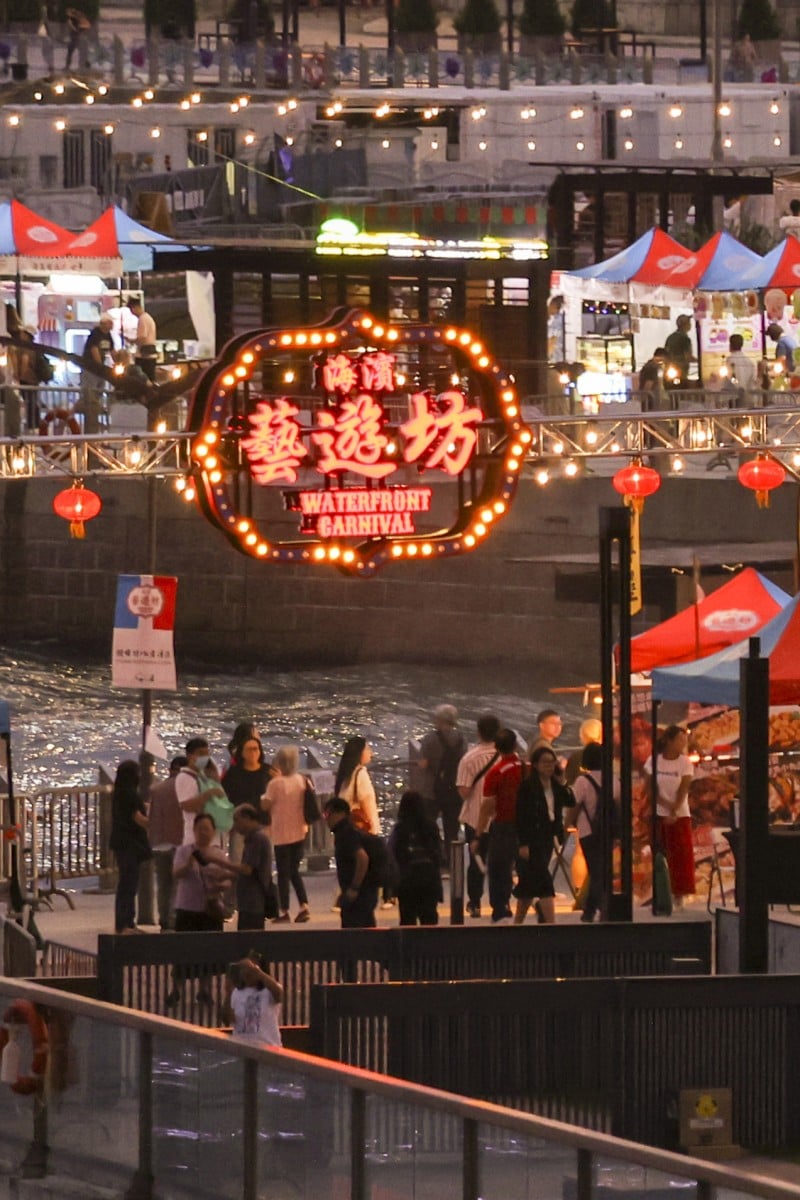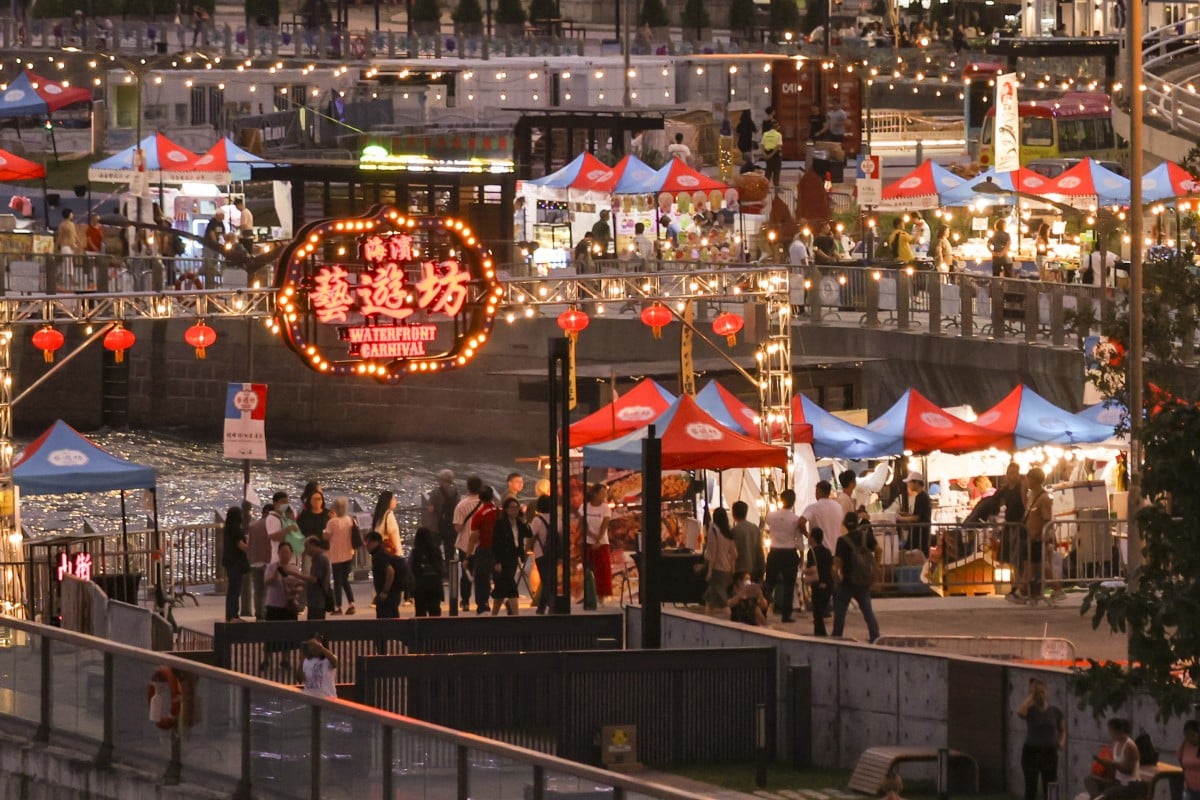
Face Off: Will boosting nightlife revive Hong Kong’s tourism industry?
- Each week, two readers debate a hot topic in a showdown that does not necessarily reflect their personal viewpoints
- This week, they discuss whether promoting nighttime activities will encourage people to visit and spend money in the city
 People enjoy food and drinks at the Waterfront Carnival in Wan Chai. Photo: Yik Yeung-man
People enjoy food and drinks at the Waterfront Carnival in Wan Chai. Photo: Yik Yeung-manIf you are interested in joining future Face Off debates, fill out this form to submit your application.
For: Chelsea Chen, 14, St Paul’s Co-educational College
Hong Kong, once known as the city that never sleeps, has not been the same since Covid-19 struck. Shops close relatively earlier, the streets are quiet at night, and the buzz on the street is missing. The economy has taken a heavy blow as a result, and the government is trying to boost nightlife to revive the tourism industry and the economy.
According to government data, tourism contributed to 3.6 per cent of Hong Kong’s gross domestic product and around six per cent of employment before Covid-19. Many Hongkongers rely on these industries for their livelihoods, so it is logical that the authorities would attempt to revive the sector after a three-year pandemic. Hong Kong’s nightlife was once a unique draw for tourists from around the world, and night markets selling local products allowed them to experience community traditions, so focusing on this aspect simply makes sense.
Your Voice: “Night Vibes” snacks are a raw deal
Along with promoting nightlife, the government’s efforts are a booster shot for services attached to the nighttime economy. Apart from pubs and restaurants, services like transport are also in focus as the government has incentivised travelling by MTR at night with a “ride five, get one free” offer. Tourists may not want to visit spots on the city’s outskirts and may want to revel in the nightlife, so the “Night Vibes Hong Kong” campaign, which focuses on more accessible places close to public transport, is a step in the right direction.
Some argue that the pandemic has led to a drastic change in the way people live, and they have become used to staying in at night, so it doesn’t make sense to promote the nightlife scene. The way around this is to introduce alternate activities. For example, movie screenings or live music shows would encourage tourists to stay out late and allow them to enjoy themselves without being affected by shops closing early.
Covid-19 has had a significant impact on Hong Kong, and we must take steps to elevate the economy and the tourism industry. Boosting nightlife is the perfect way to encourage tourism and make Hong Kong a city that never sleeps again.
Against: Grace Lam, 14, Diocesan Girls’ School
Battered by the Covid-19 pandemic, the global economy has taken several big hits, and Hong Kong’s is no exception. As the world gradually returns to normalcy, the city has introduced various campaigns to revive its finances, including promoting nightlife to revitalise the tourism industry. One such campaign is “Night Vibes Hong Kong,” which aims to organise unique and creative nighttime events.
While boosting nightlife has benefits, like supporting existing businesses and encouraging social interaction among people from different backgrounds to promote cultural diversity, the question remains: will it really help?
Your Voice: Taiwan-style night markets won’t bring tourists to Hong Kong
Hong Kong’s reopening and lifting of Covid-19 restrictions came long after many other places, so tourists began to flock to other destinations since Hong Kong was still closed. This imbalance may deter tourists from fully enjoying the nighttime activities and participating in these campaigns. Activities centred around boosting Hong Kong’s nightlife are also deeply rooted in the city’s unique culture, which may not resonate with overseas tourists.
Furthermore, focusing solely on boosting nightlife targets a specific demographic, mainly young adults who are more inclined towards entertainment and nighttime activities. This limited approach overlooks other preferences tourists may have, such as families or older travellers who may prioritise sightseeing and visiting various attractions.
Additionally, Hong Kong’s iconic street food stalls, known as dai pai dong, face threats due to licensing issues related to hygiene concerns. The removal of Hong Kong’s neon signs, which have long been a classic feature of the city, also contributes to the loss of cultural elements. These are iconic symbols of the city’s nightlife scene, and they are gone.
Alternatively, the government should consider increasing consumption vouchers for international visitors. This strategy could attract tourists and encourage spending during their visit, benefiting local businesses and the overall economy.
While Hong Kong was renowned for its vibrant nightlife before the pandemic, it was not the sole factor contributing to the city’s reputation as the “Pearl of the Orient”.
